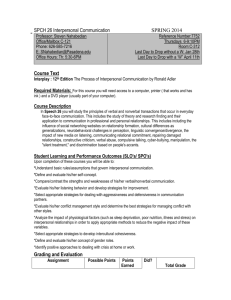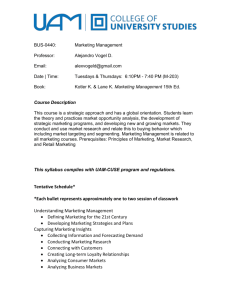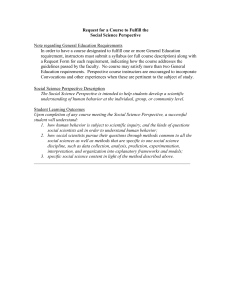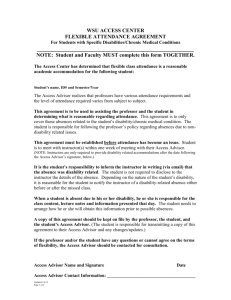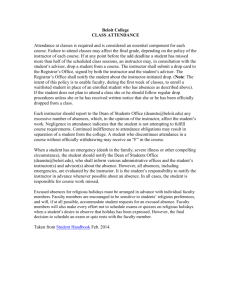COM 252 Interpersonal Communication
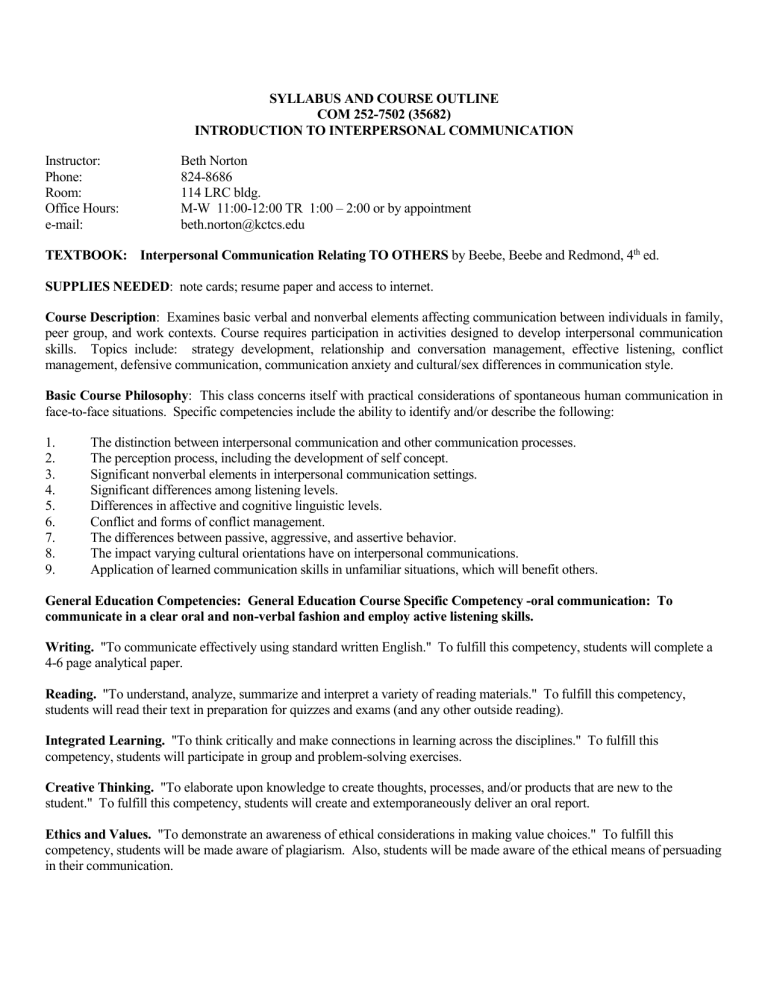
SYLLABUS AND COURSE OUTLINE
COM 252-7502 (35682)
INTRODUCTION TO INTERPERSONAL COMMUNICATION
Instructor:
Phone:
Room:
Office Hours: e-mail:
Beth Norton
824-8686
114 LRC bldg.
M-W 11:00-12:00 TR 1:00 – 2:00 or by appointment beth.norton@kctcs.edu
TEXTBOOK: Interpersonal Communication Relating TO OTHERS by Beebe, Beebe and Redmond, 4 th ed.
SUPPLIES NEEDED : note cards; resume paper and access to internet.
Course Description : Examines basic verbal and nonverbal elements affecting communication between individuals in family, peer group, and work contexts. Course requires participation in activities designed to develop interpersonal communication skills. Topics include: strategy development, relationship and conversation management, effective listening, conflict management, defensive communication, communication anxiety and cultural/sex differences in communication style.
Basic Course Philosophy : This class concerns itself with practical considerations of spontaneous human communication in face-to-face situations. Specific competencies include the ability to identify and/or describe the following:
5.
6.
7.
8.
9.
1.
2.
3.
4.
The distinction between interpersonal communication and other communication processes.
The perception process, including the development of self concept.
Significant nonverbal elements in interpersonal communication settings.
Significant differences among listening levels.
Differences in affective and cognitive linguistic levels.
Conflict and forms of conflict management.
The differences between passive, aggressive, and assertive behavior.
The impact varying cultural orientations have on interpersonal communications.
Application of learned communication skills in unfamiliar situations, which will benefit others.
General Education Competencies: General Education Course Specific Competency -oral communication: To communicate in a clear oral and non-verbal fashion and employ active listening skills.
Writing.
"To communicate effectively using standard written English." To fulfill this competency, students will complete a
4-6 page analytical paper.
Reading. "To understand, analyze, summarize and interpret a variety of reading materials." To fulfill this competency, students will read their text in preparation for quizzes and exams (and any other outside reading).
Integrated Learning.
"To think critically and make connections in learning across the disciplines." To fulfill this competency, students will participate in group and problem-solving exercises.
Creative Thinking.
"To elaborate upon knowledge to create thoughts, processes, and/or products that are new to the student." To fulfill this competency, students will create and extemporaneously deliver an oral report.
Ethics and Values.
"To demonstrate an awareness of ethical considerations in making value choices." To fulfill this competency, students will be made aware of plagiarism. Also, students will be made aware of the ethical means of persuading in their communication.
Grading: This course is designed so that students are measured on a wide variety of tasks and assignments. This assures that no single grade weighs disproportionately in the final assessment. Your grade for the course will be determined as follows:
3 exams
Attendance
Research Paper
Oral Report
Interviews
Quizzes/web work
Group discussion
100 points each
50 points
100 points
50 points
50 points
75 points - (Resume and cover letter required)
50 points
675-604 = A
603-537 = B (Drop lowest test and quiz.)
536-469 = C
468-402 = D
401-Below = E
Attendance: Studies have shown that class attendance is a major factor affecting student learning. A student missing a significant number of classes seriously hampers his/her ability to learn about a particular subject. In addition, an interpersonal communication course could hardly be "inter"-personal without persons, hence your attendance will be required. Attendance will be graded as follows:
0 absences
1-2 absences
3-4 absences
5-6 absences
7 absences
8 or more absences
50 points
40 points
30 points
20 points
10 points
0 points
Late Assignments and Extra Credit: Late assignments will not be accepted unless approved by the instructor before the assignment is missed. The acceptance of the late work is up to the instructor and will be deducted one letter grade for each class period the work is late..
Your instructor will not accept any extra credit.
Make Up Exams: Generally, make up exams are not permitted. You are allowed one test grade drop so any exam missed will automatically count as your drop grade.
Withdrawal Policy: Until Mid-term a student may withdraw from COM 252 at his/her own discretion. After Mid-term, no one will be allowed to drop the course unless there are extenuating circumstances. Failing grades are not an extenuating circumstance.
Incomplete Grade Policy: The grade of an incomplete (I) will only be given on the student's request when: (1) there is an extreme emergency; and (2) the student still has the opportunity to pass the class. "Extreme emergency" should be understood to mean something that the student could not control--such as a death in the family. Failing to complete an assignment fully or on time is not an example of an extreme emergency.
Final Grade: Your final grade will be comprised of the points obtained from grades you receive for the class. You should be able to determine what your course grade is at any time during the semester.
This class is primarily participatory in nature. I have high expectations of communication students because I believe that effective communication skills are vital to success in our culture. I will strive to make you a more effective communicator.
You will have to strive to apply what you learn to every assignment given to you.
Plagiarism: Webster's New World Dictionary defines the term plagiarize as follows: "To take and pass off as one's own ideas, writings, etc., of another."
Cheating or plagiarizing can take many forms on a college campus. Beginning college students frequently are not fully aware of what is considered plagiarism. For this reason the following list has been drawn up:
I. On examinations:
A. Copying answers from another student.
B. Copying passages from a book or magazine.
C. Bringing notes, etc., to class (whether on paper, cuffs, etc.)
D. Asking someone for the answers to test questions.
II.
D.
E.
F.
On Speeches or Outside Papers:
A. Copying from books or magazines without quotation marks.
B.
C.
Copying passages from books, altering a word here and there.
Having someone else write the paper or speech for you.
Copying a paper or speech someone else has written in the past.
Rewording the exact same idea found in a book or magazines.
Having someone correct the mistakes on your paper. (Someone else may read it, suggest revisions or reorganization, but you must do the revisions and reorganization, but you must do the revision and reorganizing.)
The student who seeks this type of help, as well as the student who knowingly gives this kind of help is guilty of plagiarism and may fail the course.
I'm interested in helping you learn about effective communication and helping you become more effective communicators.
Since I can't read minds when you have a question or don't understand something, please don't hesitate to ask.
STUDENT CONDUCT IN CLASS - Students are expected to behave as adults while in class. I expect you to be polite in class while students are sharing. Excessive talking or writing notes to other students in class will not be tolerated. Student code of conduct may be accessed at: www.kctcs.edu/student/code.htm
Use of cell phones and laptop computers are not permitted in class unless authorized by the disability resource office.
Please put cell phones away and make sure they are turned off during class. Failure to do this will result in the instructor taking the phone or laptop for the remainder of the class.
Disability Statement: If you have a documented disability and need any type of accommodation, you are required to register with the Disability Resource coordinator. Contact Valerie
Wolfe, Disability Resource Coordinator Room 139 of the John
H. Gray Bldg, 270-824-1708.
COM 252
Tentative Schedule – FALL 2009 – MW Class
08/17 Introductions/Get to know you/activities
08/19 Student Introductions
08/24 Chapter #1/Assignment: Communication Contract
08/26 Chapter #2/Quiz over chapter #1
08/31 Chapter #3
09/02 Exam: Chapters #1, 2, 3
09/07 LABOR DAY – NO SCHOOL
09/09 Group discussion material
09/14 Work in groups
09/16 Chapter 5
09/21 Chapter 6/Quiz over 5
09/23 Chapter 6
09/28 Chapter #7
09/30 Exam: Chapters #5, 6, 7
10/05 Oral reports
10/7 Oral reports
10/12- 10/16
10/19
FALL BREAK NO CLASSES
Oral Reports
10/21 Chapter 9
Mid-term – last day for student to withdraw at their discretion with a grade of “W”
10/26 Chapter 9
10/28 Chapter 10/Quiz over 9
11/02 Exam: Chapters 9 and 10
11/04 Group Discussions
11/09 Group Discussions
11/11 Job Interviewing Information
11/16 Job Interviewing Information
11/18 Work with partners/Research papers due
11/23 Job interviews
11/25 Job Interviews
11/30 Job Interviews
12/02 Final Preparation Last day for student to withdraw at the instructor’s discretion
FINAL EXAM MW 9:30 class – Wednesday, December 9, 2009
